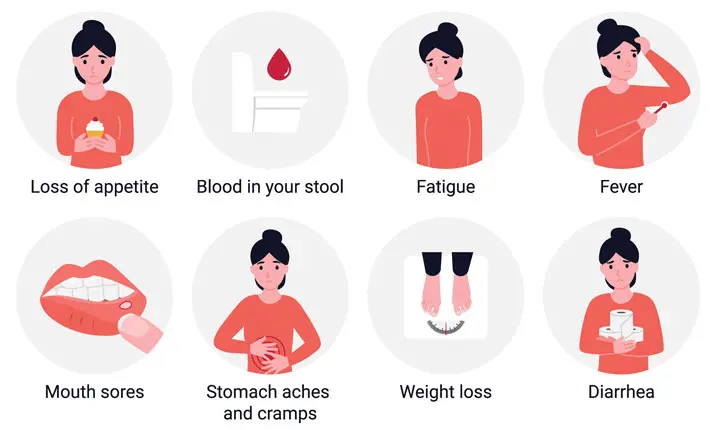Tummy troubles can happen to anyone. And we've, arguably, have all experienced spells where we've been intimately acquainted with the porcelain throne. However, if your bowel problems happen too frequently (chronic), and are coupled with severe pain or even bloody stools, it could be a sign of an inflammatory bowel disease. One such example of an inflammatory bowel condition is Crohn's disease, and it causes inflammation of the digestive tract.
What is Crohn's disease?
Crohn's disease is a chronic condition and can involve any part of the digestive tract from the mouth to oesophagus, stomach or intestines. It is not actually an infection, but an abnormal immune response where your body attacks itself. In the case of Crohn's disease, it attacks the intestine lining, causing inflammation and ulcers. Over time, this can lead to scarring and narrowing or even obstruction of the intestine.
Symptoms of Crohn's disease
Symptoms vary depending on the severity and location of the disease. Common complaints include tummy pain, bloating, diarrhoea, loss of appetite, weight loss, frequent need for bowel movements or sometimes, bloody stools. Some may also have other symptoms like mouth ulcers, red eyes, rashes or joint pain.
Its exact causes are still unclear, but your immune system, genes and environment may be factors that determine whether you'll get it. Factors that affect how severe your symptoms could get are:
- Smoking
- Use of certain painkillers (NSAIDs)
- Whether the rectum is involved
- History of bowel surgery
What are the complications?
Some cases may result in fistulas, which is when the inflammation causes ulcers to form on the inside of the intestines or nearby organs. These ulcers can then perforate the wall of the intestines which creates a tunnel for the pus to drain out from the infected area. Some may suffer from a perianal fistula which causes pain and drainage near the anus.
As Crohn's is a disease affecting the immune system, patients may have a higher risk of other immune diseases that affect other organs.
How is Crohn's disease diagnosed?
The gastroenterologist will order a blood test to look for potential issues such as anaemia (when the body lacks enough healthy red blood cells to carry adequate oxygen to your body's tissues) and inflammation. A stool test may also be performed to detect inflammation in the gastrointestinal tract.
An endoscopy may be ordered to get a better idea of the upper gastrointestinal tract and a colonoscopy may be requested by the doctor to examine the large intestines. The doctor may also perform a biopsy where they take a tissue sample during the endoscopy or colonoscopy for closer examination under the microscope.
Treatment options for Crohn's disease
While there isn't a cure yet, Crohn's disease can be well-managed.
Medical treatment aims to reduce the active inflammation and prevent relapse of the disease. Lifestyle modifications in the form of diet may be helpful in alleviating symptoms. Irritable bowel syndrome is common among patients with Crohn's disease, and it shares many similar symptoms. A food diary along with diet modifications may help in controlling the symptoms.
Medication is key when it comes to keeping the disease in remission. It can be used alone or in combination and may include:
- Mesalazine is an anti-inflammatory agent often used in treating mild Crohn's disease.
- Steroids are often prescribed to patients with severe Crohn's disease to quickly suppress active inflammation. Generally, its usage is short term to minimise any long-term side effects.
- Immunomodulators are often used as a first line treatment since Crohn's disease symptoms are caused by inflammation due to an overactive immune system. These drugs may suppress the immune system and need to be closely monitored by the doctor.
- Biologics are immunosuppressive drugs and are similar to immunomodulators. However, they are more specific in the way they block certain types of proteins which could trigger inflammation and are therefore much more effective.
An important thing to note is that as Crohn's is a lifelong disease, it may relapse when medication is stopped. Discussion with your doctor will be necessary before stopping any medication.
Surgery is usually considered when there is intestinal blockage or if the disease isn’t responding to treatment. Crohn's disease can affect any part of the intestines. So, even if a diseased part of the intestine is removed, it doesn't remove the risk of recurrence. Close monitoring is usually done via endoscopy or computerised tomography (CT) scan and magnetic resonance imaging (MRI).
If you are experiencing unusual bowel movements lasting longer than 2 weeks, make an appointment with a gastroenterologist for an accurate diagnosis. Discovering Crohn's disease early can greatly improve a patient’s quality of life and prevent any complications from arising.














